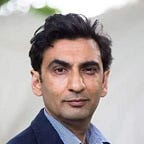‘From here to eternity…’
I have just attended the funeral of a baby that lived only for an hour after she came to life for a brief moment on this earth in the early hours of this morning.
At the ancestral homeland of my father, and his father, and his father’s father, here in Azad Kashmir, I have spent the last 48 hours fighting off jet lag and acclimatising to the local weather and terrain. Suffice to say that during the day, the temperature reaches a confident 25 degrees-plus range, suitably taking away any fears of viruses and the like.
But all is not well. As I read the pages of newspapers and websites, the coronavirus is hitting Europe hard, the lack of preparation in some countries is revealing the ugly truth of disconnected elites that people do not trust and health care providers that are woefully inadequate. A palpable fear that is driving ordinary rational people to peruse the need to stock up on rations should tighter enforcement of lockdown affect neighbourhoods, cities and entire nations. Oddly, it is things like toilet paper that are running out fast in supermarkets. As if the only important issue is how to deal with human excrement. This is combined, unsurprisingly, with stocks of hand sanitiser being depleted — which does make far more sense.
Sitting here in Azad Kashmir, life works at a somewhat slower pace. After all, this is why I chose to be here during the last few days of my parents’ stay; to relax and unwind. They are about to complete another 6-month stint and are ready to return to the UK and to face the madness of the coronavirus crises engulfing the nation. But I feel a degree of sadness, as death and elimination have become a dominant theme — both here, back in the UK where my parents live for most of the year, but also in the Netherlands, where I live and work.
The funeral this morning reminded me of the dangers of life in a part of the world where medicine and health care is more of a lottery, where providers often worry how much they can exploit poorer folk whose basic needs are rarely met in life in general. The reality does not differ wildly from the fact that a disproportionate number of marginalised folk will suffer a worse than death as the NHS struggles to cope with an inevitable crises.
As I wandered over the graveyard for the funeral this morning, the sadness gripped me further. Freshly installed gravestones litter the entrance all the way to the tips of this ancient site, with numerous unmarked graves stretching back four hundred years. Every time I come here, there are funerals: of the young, the old or the infirm. It is all very sad.
The village has changed beyond recognition. Of the primary households, only three belong to families that have always lived here, with the rest consisting of ‘muhijars’ (migrants). They are paid to live in the homes of families largely resident in the UK, all to prevent deterioration of homes and to keep the land fertile. These new families are all decent, hard-working, everyday folk, but it feels strange to have become a minority in one’s own vision of home. The long-run prognoses do suggest complete elimination unless some of the families in the diaspora pay attention to some of the risks facing the village, but this a matter of personal choice and I do not offer judgement. Certainly, my father is keen to return to the village on a regular basis — and as long as his health permits. He has invested in a garden that is still in the process of maturing and his home is furnished with all the comforts needed for a life of contentment here. Thus, in the midst of all of this emptiness, there remains a strong notion of home — at least for at least some.
Identities are social constructions. They are all imagined. Human beings are constantly in search of something that ties them to some greater notion of themselves. Too often, there is a desire to project one’s greatness through ancestry, or notions of belonging to a greater cause, but they are all for validation. Romanticising the past in the hope of making the present more palatable renders the future unplanned or unforeseen, but fatalism is embedded in the culture. My ties to this land are born of the desires of my father to instill a sense of identity — but it has only partial value for me, for I am an entirely different imagined construction of the self compared to his own, and specifically of me as his son. This is only natural but it is also hazardous. Identities should never be a straight-jacket, but too often they are in this part of the world and within the diaspora when too many look to the past to define the day when the future is all that we have. That is, until the moment it is taken away from us — by nature or by design.
I have a few more days to ponder and reflect while here in the village. I hope to find more positive themes to explore.
